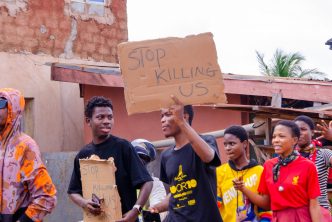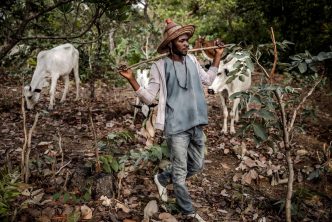Amplifying Collective Voices in Nigeria
Background
In writing Development as Freedom, one of the essential freedoms suggested by Amatya Sen is “the liberty of acting as citizens who matter and whose voices count” (1999: 288). Involving the poor in assessing their needs, opportunities, and the solutions to their challenges resolves the problem of exclusion as a dimension of poverty. The power of democracy lies in participation. This happens mostly through compromise and consensus in a conversational process for policy input. For instance, the people can indicate the type of education they want and how best they could contribute to funding it, how to distribute farm input to smallholder farmers, and the need for internet-enabled education for their children and wards. This essay interrogates voices and governance in Nigeria.
Silent Voices
The need for freedom is mirrored in society’s continuous struggle with the state for a more open society. In modern political practices in Africa, one core gap in state-society relations is the absence of debates on the economic, social, and political options available to the people. Excluded, citizens withdraw into their private spaces with the consequence that a dominant few manipulate the governance space. In effect, popular participation narrowly focuses on elections that merely serves the interest of a powerful few. This results from political leadership, which has failed to bring to the fore the issues that need debating.
Suppressed voices are familiar in various spaces of governance in Nigeria. Using participation as a global indicator of voice in budgeting, Open Budget Survey 2019 scores Nigeria 22 percent. This measure looks at indicators that are central to voice. The 2015 and 2012 scores had also been low at 25 percent and 16 percent, respectively. Another measure of voices is the availability of rights for free speech. This measure relates to the right to criticise government policies without consequences, suggest alternative policies, independently monitor governmental projects, and report findings on their implementation. The lack of voice as an essential component of democratic development invites action for a people-driven governance model. In one experimental instance in Anambra state (to be discussed later), voice amplification became a stimulant to popular interest in budgeting.
In Nigeria, budget governance does not command meaningful input from the people. Policymakers presume complete knowledge of citizens’ needs and ignore the input of essential stakeholders in their policies. This practice loses the valued contribution of the citizens that would have enriched the content of budgets.
Dialogues for Democratic Development
How best to define responsibilities and extend services to the weakest in communities through public finance should be subject to local debates. Dialogues and consensus give a sense of ownership of public decision. Indeed, in instances where communities have undertaken self-help in infrastructure, they are better organised and responsive to their own decisions while completing targeted infrastructure at a realistic cost. Besides, such infrastructures are well maintained and protected. Above all, they do not exclude any beneficiary. The practical contexts for the reality of these claims are town union systems that are common in the southeastern part of Nigeria and the sound management of local cooperative organisations in southwestern parts of the country. No doubt, several other people-driven local initiatives exist in other parts of the country. The success of such efforts lies in the centrality of collective voices.
Public policy practice would undoubtedly benefit from learning from the conversational practice common in the citizens’ everyday lives and replicating it in the form of governance dialogue. This can be useful in budgeting and other areas. This step would circumvent policies that lack popular input.
The promise of citizens’ voices in governance is already manifesting in Anambra state, where an NGO intervention created spaces for contribution from below to annual state budgets. Through capacity building, ordinary citizens were given a tool called the Community Charters of Demand (CCD). The CCD requires the various segments (youth, women groups, men’s groups) of each local community to discuss and develop four needs in their order of priority. The local government sends the CCD to the state budget office. Based on this framework, the budget office no longer carries out needs identification because communities have democratically done so.
During budgeting, the state selects from the people’s identified needs and captures them in the budget. The communities monitor the implementation and report back to the government using their Community-Based Monitors. The community monitoring report is necessary for the payment of the contractors. Incidentally, this novel democratic framework applies to a limited fraction of the budget. However, it indicates a unique governance practice based on voice amplification.
How to Amplify voices for Active Citizenship and Development
Active citizenship warrants safe spaces for contribution to matters that affect one’s life and society. Democratising development is about creating conditions for the generalisation of opportunity for participation and inclusion. The vehicle for achieving this is a participatory voice, which is enabled in the following ways:
- Identifying the spaces in which citizens find safe to present their views. Such a platform must be accessible, tolerant, and relate well with people’s everyday lives. Town unions, cooperatives, women, and youth associations are veritable points of consideration for such spaces.
- Systematically linking agreements from deliberations with official state processes. In the case of Anambra State referred above, budget call circulars, as a rule, are sent to the leadership of town unions. Usually, each community submits its CCD with minutes of meetings of the youths, women, men, and another minute of a joint meeting in which the groups prioritise their identified community needs. Thus, there is a need to support such processes with legislation.
- Involving the citizens’ views in governance must not be a matter of regime interest in which inclusion and use of popular voices in policy decision are dependent on the whims of the leader.
- Conscious training of communities on their citizenship rights and organizing and making demands in governance is key to this process.
Conclusion
Democratic development can only gain steam and continuity with inclusiveness. Projects and programmes are best protected and sustained when people take ownership of them. It is the voice that lays the background for the sense of ownership. Voice enablement is possible by training citizens as stakeholders at the very local levels to organise their ideas, make inputs, and ask for their entitlements around budgeting and other governance matters.







